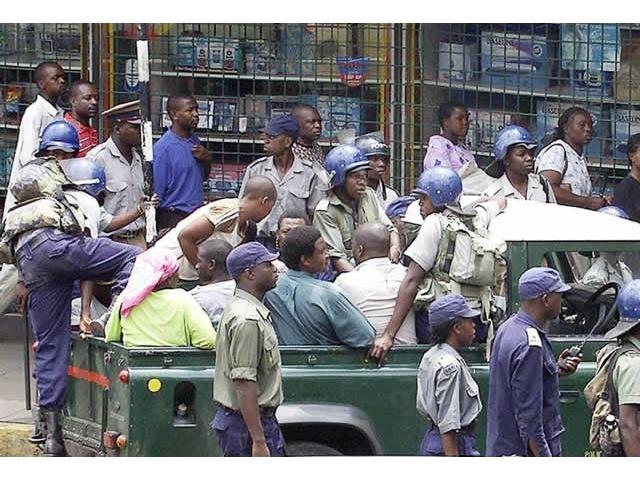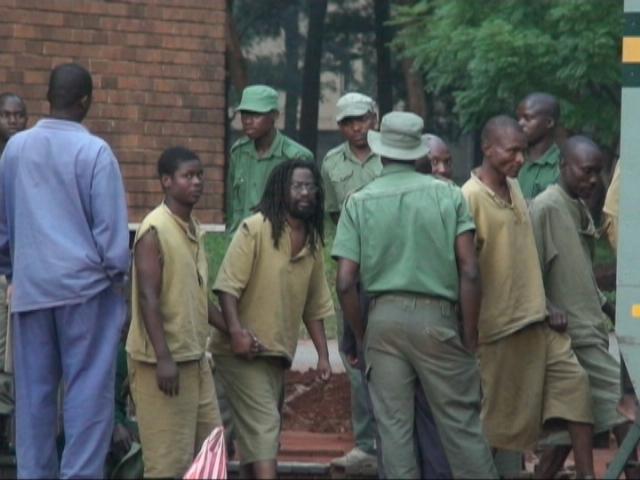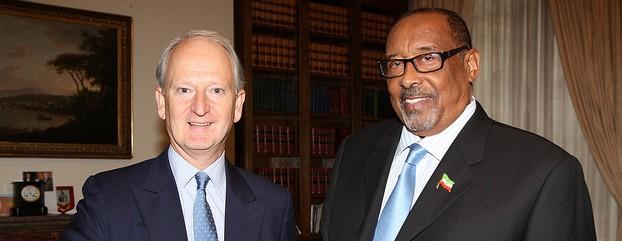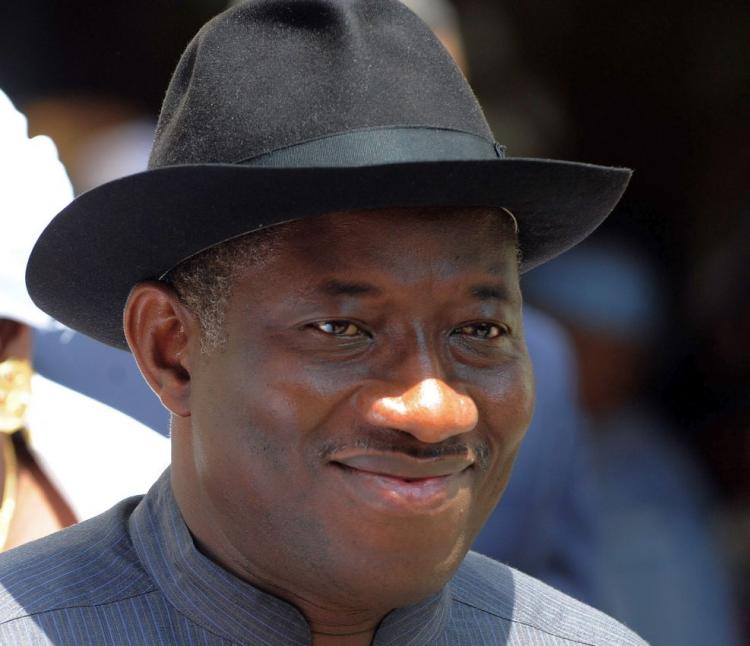Mugabe Pushing Zimbabweans to the Brink? – By Marko Phiri


(Photo credit, Solidarity Peace Trust) Munyaradzi Gwisai, a prominent lawyer and former MDC legislator, arrested last year and charged with treason after organising a public meeting where participants watched videos of the Arab Spring.
In Zimbabwe, serious questions are being asked as to whether President Robert Mugabe is bent on stirring the country back to the political chaos of 2008 as his party Zanu PF stalls the constitution making process prior to elections
Without a new constitution, elections are unlikely to be held – constitutional reform being one of the conditions the Global Political Agreement (GPA) signed in September 2008 by the three governing partners.
But as Mugabe’s Zanu PF digs in, the fear that the party instilled in the hearts of commercial farmers during the farm invasions at the turn of the century has now been revisited on ordinary folk.
With Mugabe still wielding control over the very repressive state security apparatus, his jingoism has led to questions about what his aspirations are for a country recovering from world-record breaking inflation. All pretence of a “popular uprising” have been quashed by the so-called securocrats.
At the height of the Arab Spring, and the subsequent street clashes between civilians and the uniformed forces in the Maghreb, Zimbabwe’s Defence Minister Emmerson Mnangagwa and other military men were quick to warn that there was no room for those aspiring to import such activity to Zimbabwe.
The fact that the Defence Minister and his barracks cohorts raised this was in itself telling: they knew Zimbabweans were agitating for their own version of the protests that had helped oust Egyptian President Hosni Mubarak (a long-time Mugabe ally.)
Mugabe has come to epitomise that historical caricature of African strongmen who, in their efforts to perpetuate bad governance, create dystopian nationhoods by unleashing the terror of the armed forces on civilians.
It has been well documented how virtually all sectors of Zimbabwe’s public services have been stuffed with “retired” army generals. From the body in charge of elections, to railways and even football administration, the army badge has become ubiquitous.
It comes as no surprise then that, as the country makes tentative steps towards polls, the military is at the centre of resistance toward any reforms that threaten Mugabe’s exit (and by extension their own) – be they constitutional, media or electoral. Such resistance is based on the central claim that anything else “countermands” the “sacrifices of the liberation struggle!”
This obsession with all things military became writ large when it was announced (without any hint of irony) that Zimbabwe had bought weapons from South Africa – a sign that nothing is being left to chance ahead of the elections. Yet, the very fact that the same political opponents the guns are aimed at sit with Mugabe in government smacks of the futility of efforts to create ideal conditions for “a free and fair” election.
Finance Minister and MDC secretary general, Tendai Biti, has previously resisted pressure to pour millions of dollars into the recruitment of soldiers, and predictably, his critics within the Zanu PF establishment are quick to claim that his priorities are firmly ensconced in “Western capitals.” Mugabe claims the West considered a military invasion of Zimbabwe at the height of the country’s economic crisis in 2008/09, only to be foiled by Chinese opposition.
The fate of a whole rogues gallery of African autocrats – including the bloody fall of Libyan strongman Muamur Gaddafi (who shared the same rabid pan-Africanist idealisms and rhetoric on “American imperialism”) – is too vivid for Mugabe’s Cheka-like operatives, a veritable throwback to the Soviet era!
Thus it is that many Zimbabweans, who openly swarmed streets in the election euphoria of 2000 that shook Mugabe, have been reduced to muted blissless reveries, imagining they could well do with localising that kind of Arab Spring violence.
But Mugabe has always been quick to show that he brooks no protest against his 32-year stranglehold on power. What is interesting about Zimbabwe is that many would in general conversations extol the toppling of leaders (as happened in Egypt, Libya and Tunisia). When Mubarak was toppled, many wondered whether Zimbabwe was ripe for televising its own revolution.
Latterly, it has become clear that the warnings President Mugabe issues out to would-be protestors have been taken to the letter. After all, The President’s history of violence is well documented.
From as early as 1980, Mugabe has not disguised violence as a favoured weapon of choice when faced with opposition to his rule – boasted of having “˜degrees’ in the subject. This has effectively succeeded in cultivating a fear of not only active participation in politics but even such mundane things such as expressing one’s political preferences.
A recent survey by a local elections watchdog confirms what has always been known – Zimbabweans fear anything to do with politics. It wasn’t surprising that during the just ended national census enumeration exercise, some residents refused to be counted, firmly believing that their personal details were going to be fed into the database of Mugabe’s feared Central Intelligence Organisation (CIO). This spy agency is long accused of hounding Zanu PF opponents.
It can be argued that Mugabe has succeeded in instilling unpatriotic fear among Zimbabweans, which has served as a very useful tool to perpetuate what his trusted lieutenants revealed in explosive WikiLeaks from the US Harare Embassy cables – he has long passed his relevance to local politics.
But this has still not damped his resolve to continue with his project, which over the years has appeared to be a pathological determination to take the country down with him, wherever it is he is going.
The 88-year ruler is full of ironies and contradictions.
He has insisted that he will not retire from active politics as long as “his people” want him – conveniently forgetting that he has been rejected by the electorate since 2000. He has also said he will not step down as Zanu PF leader because there is no one within the party ranks worthy to untie his sandals, to borrow from Christian allegory.
This itself is seen as scathing indictment on his kind of leadership. It has thus been asked how he could have failed to groom a successor during his long reign, betraying the fact that he has always wanted to be in charge until his expiration.
But as his biographer the late Heidi Holland put it, he still imagines himself as a young lad and is reliving a lost past. Yet this does not detract from what appears to be a morbid desire to also revisit the street protests of 1998, where thousands took the police head-on as they protested against bread prices and a rising cost of living.
These would-be protestors know only too well the fate that awaits them.
The bruised face of Morgan Tsvangirai when he was beaten by police during a botched 2007 peace rally, the bare bruised thighs of senior MDC official and feminist Grace Kwinje, the bandaged head of constitution law professor and long-time Mugabe critic Lovemore Madhuku, the picture of the then 64-year old Sekai Holland writhing in pain after police reportedly screamed “hit her buttocks hard,” the bloodied face of the MDC’s then Information Secretary Nelson Chamisa, the disappearance of opposition activists since independence in 1980, and the failed so-called “Final Push“ of 2003 remain vividly etched in people’s minds.
We also have the brutality of the March 2008 election violence – unleashed by Mugabe loyalists and state security agents – to remind us of the folly of choosing a political party other than Zanu PF.
What then are the options for millions of Zimbabweans both at home and abroad faced with Mugabe’s recalcitrance? Not even the United States, long accused of taking up other people’s fights for democracy, seems to have a clue.
All efforts to redirect Mugabe away from imminent chaos have fallen on very obdurate ears. Meanwhile, Zimbabweans stand aside and look, but they ask: till when?
Marko Phiri is a journalist/writer based in Bulawayo, Zimbabwe.







[…] “Western capitals” as Mugabe claims the West did try a military invasion on Zimbabwe! Â Read more… Share this:ShareTwitterFacebookLike this:LikeBe the first to like this. This entry was posted in […]
Despite all the criticism and points brought forward as to the rule of the premiere R.G Mugabe, his rule cannot and will never be compared to anyone who once or will try to rule Zimbabwe , he has put a land mark that can never be surpassed by any either aspiring or a wanna be leader of zimbabwe. it is by and large that we note that Zanu-pf’s policies are sound and are culturally and traditionally fit to sustain the country yet they lack implementation. And the so called messianic Morgan Tsvangirai will take this country into an abyss of confusion and doldrums of economic collapse as the M.D.C. (T)’S policies are flawed , we can bank on mdc for implementation but what about the social fibre of zimbabwe? the morality and upholding of certain policies . it is food for thought that the mdc is capable to lead the zimbabweans into the promised land because it is better the devil we know than the angel we have never met